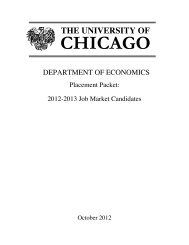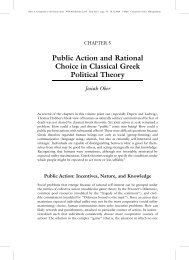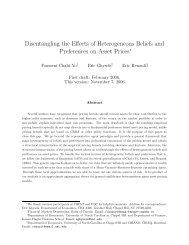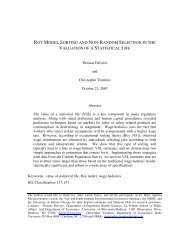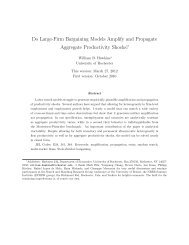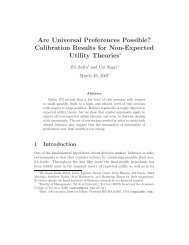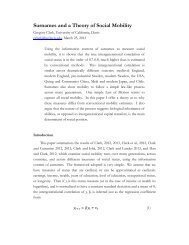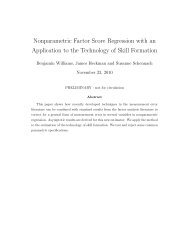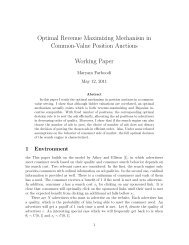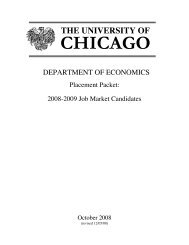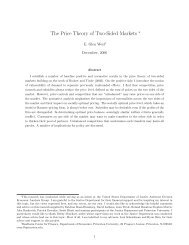Graduate Program Guidebook - University of Chicago Department of ...
Graduate Program Guidebook - University of Chicago Department of ...
Graduate Program Guidebook - University of Chicago Department of ...
Create successful ePaper yourself
Turn your PDF publications into a flip-book with our unique Google optimized e-Paper software.
38001 APPLIED MACROECONOMICS: MICRO DATA FOR MACRO MODELS (Davis / Hurst)This course considers the use <strong>of</strong> data on households, workers and producers in research onconsumption behavior, labor market fluctuations, business dynamics and other areas <strong>of</strong>macroeconomics. A key goal is to help students develop the ability to identify interesting researchquestions and devise promising research strategies. Topics include life cycle consumption behavior,home production and time use, housing market dynamics, wage rigidities and their consequences,unemployment fluctuations, employer behavior on the hiring margin, entrepreneurship, and businessproductivity dynamics. Lectures treat a mix <strong>of</strong> important, well-established research contributions andnew, <strong>of</strong>ten rough, papers that seek to advance the frontier. Homework assignments aim to buildpr<strong>of</strong>iciency in the use <strong>of</strong> micro data to address macroeconomic issues, expose students to a variety <strong>of</strong>useful data sources, and give them first-hand experience in identifying and evaluating researchquestions and strategies. (=BUSF 33942)38102 APPLIED MACROECONOMICS: HETEROGENEITY AND MACRO (Vavra)This is a course on empirical macroeconomics with a focus on using micro data and models withmicroeconomic heterogeneity to understand macro phenomenon. Recent increases in computationalpower and the availability <strong>of</strong> "big data" have been transformational in empiricalmacroeconomics. The use <strong>of</strong> micro data provides additional discipline on macroeconomic models and<strong>of</strong>ten leads to insights or conclusions that differ from analysis using aggregate data alone. In thiscourse, we will build the computational tools necessary to bring micro data to heterogeneous agentmacro models. The first half <strong>of</strong> the course will focus mainly on topics related to households while thesecond half will focus mainly on topics related to firm behavior. Some particular applications includerisk sharing and insurance, the welfare costs <strong>of</strong> business cycles, the role <strong>of</strong> transaction costs andlumpy adjustment, the effects <strong>of</strong> economic stimulus, the aggregate implications <strong>of</strong>volatility/uncertainty and understanding the aggregate dynamics <strong>of</strong> consumer durables, inflation andinvestment. (=BUSF 33949)38900 THEORY OF FINANCIAL DECISIONS I (Fama)This course is concerned with models for portfolio decisions by investors and the pricing <strong>of</strong> securitiesin capital markets. The material is covered in a rigorous analytical manner, although formal technicalrequirements are minimal. The reading list is extensive. The expectation is that the average studentspends 15+ hours per week on the course, outside <strong>of</strong> class. Grades are based on weekly take-homeexam questions, about five problem sets, and a term paper. Class participation (I cold call) is alsoused to determine grades. This class cannot be taken pass/fail or for an “R.” Written pro<strong>of</strong> <strong>of</strong>permission from the Instructor to enroll in this class is required at the time <strong>of</strong> registration.Attendance at the first class is mandatory.This course is intended for (i) first-year Booth Ph.D. students with no finance and (at best)undergraduate economics and statistics backgrounds, and (ii) second-year MBA students with ratherminimal economics and statistics backgrounds. Students with stronger backgrounds in economicsand statistics are likely to find the pace <strong>of</strong> the course, and the exam and problem set requirements,somewhat tedious. Such students are better served by the Booth Ph.D. Asset Pricing courses <strong>of</strong>feredby Cochrane, Constantinides, and Heaton. (=BUSF 35901)39001 THEORY OF FINANCIAL DECISIONS II (Diamond / Sufi)This course provides a theoretical and empirical treatment <strong>of</strong> major topics in corporate finance,including: capital structure and financial contracting; investment decisions; bankruptcy; and themarket for corporate control. The course is designed for Ph.D. students interested in corporatefinance. Grades will be based on problem sets, referee reports, and a final examination. PQ: ECON38900/ BUSF 35901. (=BUSF 35902)21



